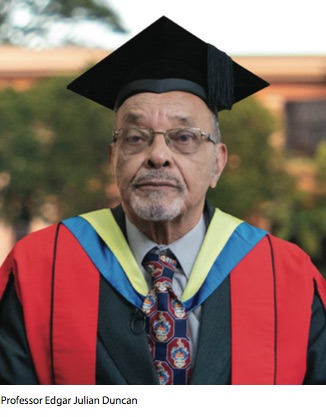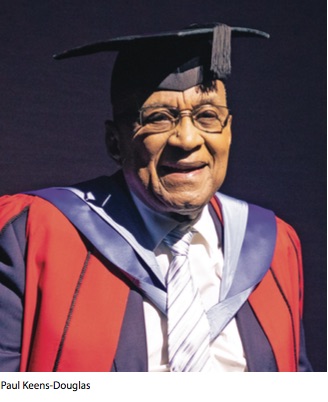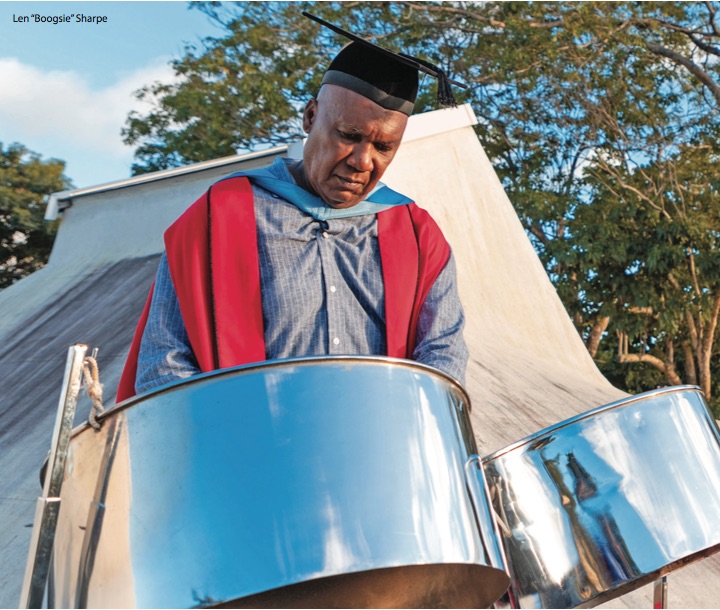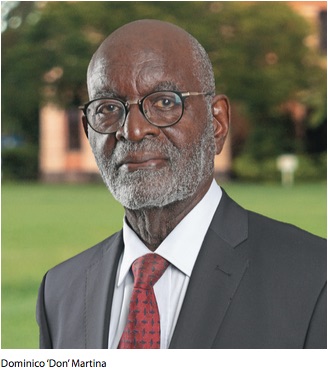The UWI St Augustine Campus conferred four honorary degrees during The UWI 2020 Graduation ceremonies. Masters in the fields of music, story, science and leadership, their success is even more praiseworthy because it is centred in service to Caribbean society.

Professor Emeritus Edgar Julian Duncan has enjoyed an illustrious, nearly 40-year career during which he’s contributed important biotechnological research that had a significant impact on the mass production of Caribbean crops. Although he’s won awards for his work in both research and education, Duncan says his mission was not to win awards, but to change the local landscape. This most recent accomplishment -- receiving an honorary Doctor of Science (DSc) degree from his alma mater - is humbling nonetheless.
“All the awards I have received have humbled me because I really didn’t set out to work for awards. I set out to do something to advance the subject, but I’m very honored by having it presented to me,” said Duncan. He added that lecturing was key to developing a “cadre of who are scientifically trained and can do scientific investigation as it relates to us in the Caribbean.”
Among his many accomplishments, which include introducing Plant Tissue Culture as a discipline to St Augustine, publishing two books and serving as Head of Department of Life Sciences and Deputy Dean in the Faculty of Agricultural and Natural Sciences, Duncan says he’s also proud to have founded the UWI Biological Society -- a vibrant organisation still in existence today with an important focus on environmental issues.
Duncan says he made a deliberate decision to come home after completing his PhD at University of St Andrew’s in 1963, and does not regret turning down a position in Scotland to work at The UWI. “Had I stayed at St. Andrew’s, I would’ve been a cog in a well-oiled machine, and I don’t think that after 35 years I would’ve been able to look back and say this is what I accomplished. I came here in the pioneering days and I can look back with a great deal of satisfaction.”

Storyteller, writer and producer, Paul Keens-Douglas said he was honoured to receive an honorary Doctor of Letters (DLitt) for his contribution to the arts and culture, while echoing similar sentiments of working towards change and not fame. “When you work, you don’t work for honours, you do so for the joy, especially in this area of work. The honour itself is a sign of what you’re doing and why you’re doing it,” he said.
An alumnus of Concordia University and The UWI Mona, Douglas’ stories and plays have been featured on the BBC, National Geographic and widely in Caribbean and US media. Additionally, Douglas is an advertising professional, and motivational speaker. While he is fondly remembered for his character, Tim Tim, and the annual production, the Carnival Talk Tent, he holds two accomplishments close to his heart. The first is his ability to turn art into a career.
“The fact that I live and work off of my art is very important. I’ve been working full-time as an artist since 1971 and that’s very hard to do in the Caribbean -- to make this a career -- and the success of that is one of my major gains, and it has been an inspiration for other artists as well,” said Douglas.
The second is his advocacy for the use of dialect in communications and theatre. Douglas expertly used dialect in now classic works such as Tanti at de Oval, but the local language wasn’t always highly regarded. “There’s a boost of self-esteem and respect and joy in being able to contribute to society promoting the native language and culture, a strong nationalism. It was difficult in the early days and a challenge to use dialect, however, it’s very natural now to hear dialect in theatre and commercials, etc but I had to fight for it.”

As a young steelpan player, Len “Boogsie” Sharpe, said he intended to promote the national instrument and culture globally. Four decades later, Sharpe can safely call the steelpan an internationally recognised instrument and himself an esteemed composer, arranger and performer. According to Sharpe, the honorary Doctor of Letters (DLitt) is the highest award he’s received in his career.
The Phase II Pan Groove founder made history in 1987 when his band became the first to win the Panorama competition with his own composition, “This Feeling Nice”. Sharpe would go on to win over 20 titles. He has worked with bands both locally and internationally, with compositions and recordings in multiple genres including another historic recording on the Percussive Harmonic Instrument (PHI) which was developed at UWI St Augustine.
A career highlight, however, was the 2000 World Steelband Festival where he composed, arranged and soloed with the winning band, Skiffle Bunch. His composition, “In the Rainforest,” was inspired by the late Pat Bishop who Sharpe said was a major supporter.
“I see that as one of my biggest achievements – to see the whole of Jean Pierre Complex stand up and applaud was amazing,” said Sharpe, who added that he is most satisfied with his music when it sways audiences. “Music is a sport. You win some, you lose some, but to reach people with your music, to meet people who really appreciate and love your music, is a beautiful thing.”

Former Prime Minister of the Netherland Antilles, Dominico “Don” Martina is a political stalwart extremely deserving of the honorary Doctor of Laws (LLD) degree. Martina began his political career in 1971 when he co-founded Movementu Antia Nobo, which was an anti-colonial, pro-worker organisation. He would go on to serve in various positions such as Labour Inspector in the Ministry of Labour and Social Affairs, Head of Social Affairs and Labour Affairs, Commissioner, Island Government of Curacao and as a Member of Parliament before becoming Prime Minister.
In his video message at the graduation ceremony, Don Martina explained that he embarked on a political career because "I lived and experienced the consequences of social and economic inequality." This, he added, gave him "a burning desire to make a contribution".
An alumnus of both The UWI and Columbia University, Martina played an integral role in the recognition of Curaçaoan slave revolt leader Tula as a national hero through his organisation Fundashon Rehabilitashon Tula. He served as Prime Minister of the Netherlands Antilles from 1979 to 1984 and then again from 1986 to 1988.
Describing his outlook on politics and the role of citizenship, Martina said, “The talents that a country creates should give back from their part to help the advancement of the country. If we do not give from ourselves to help the progress of our country, who will do it for us? Who will do it for us, if we don’t have the courage and the ability to do certain sacrifices to help our country forward?”